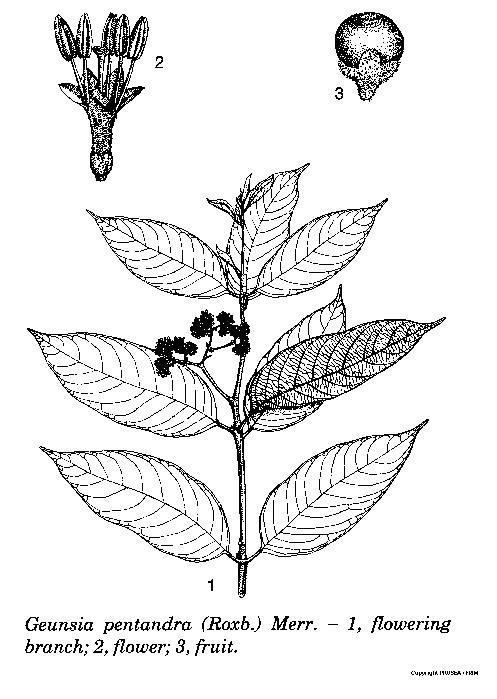Scientific Name
Callicarpa pentandra Roxb.
Synonyms
Callicarpa acuminatissima Teijsm. & Binn., Callicarpa affinis Elmer, Callicarpa clemensorum Moldenke, Callicarpa cumingiana Schauer, Callicarpa hexandra Teijsm. & Binn., Callicarpa serrulata (Hallier f.) Govaerts, Callicarpa subglandulosa Elmer, Callicarpa subternata (Hallier f.) Govaerts, Geunsia acuminatissima (Teijsm. & Binn.) H.J.Lam, Geunsia anisophylla Hallier f., Geunsia cumingiana (Schauer) Rolfe, Geunsia farinosa Blume, Geunsia furfuracea (Bakh.) Moldenke, Geunsia hexandra (Teijsm. & Binn.) Koord., Geunsia hookeri Merr., Geunsia pentandra (Roxb.) Merr., Geunsia serrulata Hallier f., Geunsia subternata Hallier f. [1]
Vernacular Name
| Malaysia | Tampang besi, ambong (Peninsular); tambong (Sabah) [2]; piat, ambong, kata kera, membatu putih [3] |
| Philippines | Layaupan (Bagobo) [2] |
Geographical Distributions
Callicarpa pentandra is widely distributed in India, Peninsular Malaysia, Singapore, Sumatra, Java, Borneo, the Philippines, Sulawesi, the Moluccas, New Guinea and the Solomon Islands. [2]
Botanical Description
C. pentandra comes from the family of Verbenaceae. This is an erect shrub to small or medium-sized tree that can grow up to 25 m tall. [2]
The bole is up to 50 cm in diametre and buttressed. The twigs are stellate-mealy indumentum. [2]
The leaves arrangement are partly opposite and partly solitary. They are simple, ovate to oblong-ovate or oblong-elliptical with a size of 9-30 cm x 3-12 cm, cuneate to rounded at base, acuminate to caudate at apex, entire margin, leathery, stellate-hairy, gland-dotted below and prominently pinnately veined. The petiole is 1-5 cm long. Stipules are absent. [2]
The inflorescence is an axillary cyme on a 2-10 cm long peduncle, whitish to brownish stellate-tomentose and many-flowered. Flowers are bisexual, regular, usually 5-merous and very short stalk. Sepal is shortly bell-shaped, about 2 mm long. The petal is with about 5 mm long tube and 2 mm long lobes, white to greenish and pink or purple. The stamens are inserted on the base of the petal tube and exserted. The ovary is superior, usually imperfectly 5-celled, exserted style and broad stigma. [2]
The fruit can be of 4-6 mm in diametre with a depressed-spherical drupe, red to black when mature and usually breaking up into 10 in 1-celled nutlet. [2]
Cultivation
C. pentandra occurs in mixed forest, primary as well as secondary forest, often in edges and along roads, also in brushwood up to 2000 m altitude. It is locally common. [2]
Chemical Constituent
No documentation
Plant Part Used
No documentation
Traditional Use
No documentation
Preclinical Data
No documentation
Clinical Data
No documentation
Poisonous Management
No documentation
Line Drawing

References
- The Plant List. Ver1.1. Callicarpa pentandra Roxb. [homepage on the Internet]. c2013 [updated 2012 Mar 23; cited 2015 Apr 22]. Available from: http://www.theplantlist.org/tpl1.1/record/kew-30923
- Callicarpa pentandra Roxb. Merr. In: Lemmens RHMJ, Bunyapraphatsara N, editors. Plant Resources of South-East Asia 12 (3): Medicinal and Poisonous Plants 3. Leiden, Netherlands: Backhuys Publication; 2003.
- Herbal Medicine Research Centre, Institute Medical Research. Compendium of Medicinal Plants Used in Malaysia. Volume 1. Kuala Lumpur: HMRC IMR; 2002. p.135.


